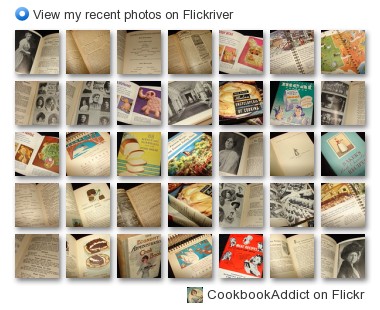
TIPS
* Just because a price guide said it was worth a certain price doesn't mean that's what it's going for. A book is worth only what someone is willing to pay for it, just remember that if you're thinking of selling later. Just because it's old doesn't mean it's valuable or rare. Usually authors that are setting prices are selling at the same time and in my opinion not a fair assesment of the market.
* The same word of caution goes for looking up a books worth online. There are scams going on a certain search shopping site where the seller lists the book WAY overpriced and then lists it again at a more normal price to make the lesser look like a steal. I feel terrible for the people that think their cookbook "was going for $80 on the internet!" when in actuality it's realistically worth $15. Find someone knowledgeable and transparent in prices and ask them questions. We all know if they are selling books as a profession they're expecting to walk away with some kind of profit for knowing their field and uncovering these hidden treasure and that’s acceptable but they shouldn't be trying to scam anyone. Check feedback scores!

* Be careful of some online auction sites. Some people unload their crappiest and damaged stuff online making the description of the condition sound acceptable, hiding damage with “creative” camara angles and then ending up having a no return policy when you find out that the description was "sugar-coated". On the flip side you can get amazing steals this way also, it’s a gamble but sometimes it's the only way to get your hands on some of the bigger names. Sometimes you have to start at the bottom of the condition ladder and work your way up, if that's the only thing you can afford. Ask for pics though, the seller should be happy to oblige even if you ask for 20 more pics!
*Usually in the book collecting world writing and personalizing in the copy would decrease the value but that's not the case with cookbooks. The average cookbook collector values the personal touches and the little notes next to the recipes.
*Buy what you like and think "what if I never sell this book" will you be happy to keep it forever. If you are then in my opinion it's a win-win.
*Have fun but set a price limit!
*Research the authors and who they are. There are so many informative articles that go into the history of what makes a book so valuable. Maybe it's the illustrations and cover art or it's the 1st printing of a recipe classic.

*Condition is a huge deal and ALWAYS buy the best you can afford.
Mistake printings can also contribute to a book's value just like baseball cards.
*You can get a feel for whether or not you're going to find anything in vendors stall just by reading a couple titles. Do not spend 2 hours in every stall or store reading every title! Although this is coming from somebody that has spent 6 hours doing the exact thing I suggested not to do:) Odds are that a guy selling antique car books and mags won't have a 1st edition Joy of Cooking but again these are ODDS, So sometimes you gotta play them:)
Other areas to collect
You also might decide to collect what you think is GOING to be popular in 20-30 years. That's a great way to ensure long term success and view your collection as more of a investment versus just a hobby. They're alot of people who decide to sell an entire collection once it's complete if there’s an actual and definite end or what they've accumulated over 40-50 years of collecting. Both ways are very profitable.
You might also decide to collect a spin-off of cookbooks such as Homemaking or Housekeeping books of the past. These are also great sources of information and invaluable tips about every problem you can imagine. These books are the original sources of "old wives tales" which of recently you’ll find more people are turning to for alternative remedies. There’s also parenting, family and vintage crafting books that have become extremely popular as of recently.
There is focusing on the kitchen as a whole, usually narrowing it down to a certain decade or era but then collecting utensils, bowls, equipment and maybe decorating examples.
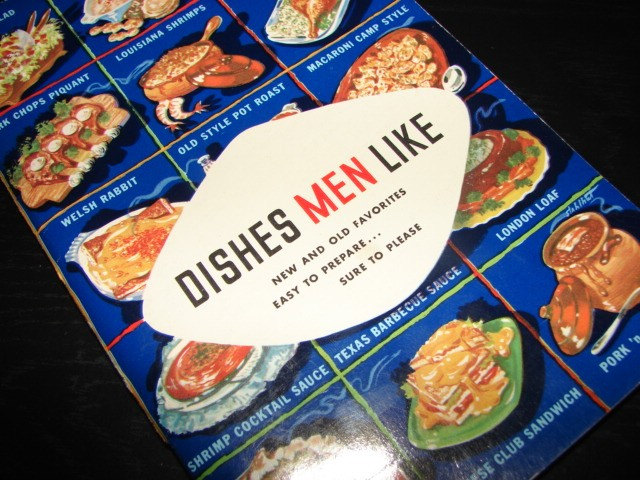
1950
-The Cookbooks of the 50's are great for the retro lovers in all of us. With the 50’s comes images of kids with slingshots in their back pockets and happy families around the breakfast table, they make you happy and smile just thinking about them. At least to younger generations, talk to someone straight out of the 50’s and they’ll probably paint you a different picture but great covers of dancing hotdogs and women in pearls standing over stoves came out the era. I'm personally not a big fan of the recipes, Jello salads and americanized chop suey all over the place, they’re usually very creative, shall we say with ingredient pairings but great nontheless. At this time there was a huge explosion of pan-am and latin culture love, think Ricki Ricardo ( I Love Lucy). From that comes Chiquita Ba
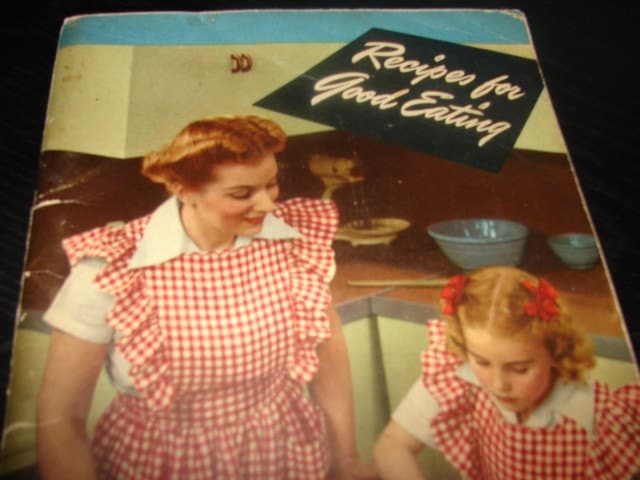
nnana and Brazil Nuts and etc. in a lot of the advertising and re
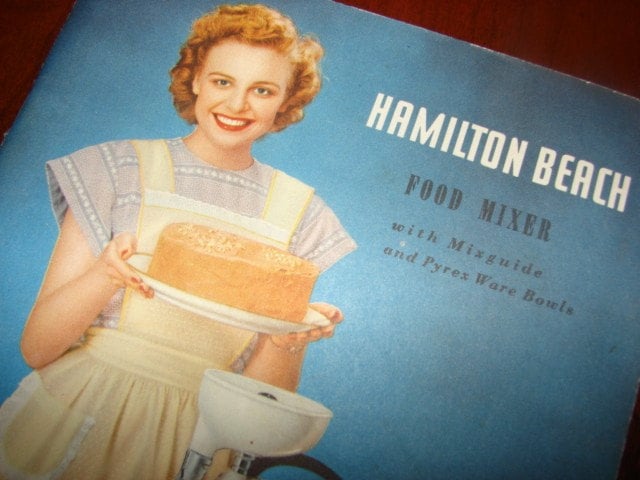
cipes.

1940
-The cookbooks of the 40's are great! There’re great dinner party and hostessing ones at about this time. If you can find some of the WW2 related ones they're super facinating to read. Subjects like how to bake with limited eggs and milk, what types of cuts of meat to pick to make you budget stretch and of course, victory garden cookbooks and home canning guides. The rationing chapters that are usually added to the bigger name cookbooks can sneak through a dealers eyesight and can be picked up for a steal if you know what your looking for. Usually very patriotic in illustrations and general theme. They're also valuable because of cross-collectibles meaning more than just cookbook collectors would want them. Company advertising booklets started to aim their efforts at homemakers and housewives at about this time due to leftover processed food products from the war. Their pitch? Let us make your life easier so you can enjoy the funner asspects of life like having dinner parties and bridge luncheons that lo and behold also
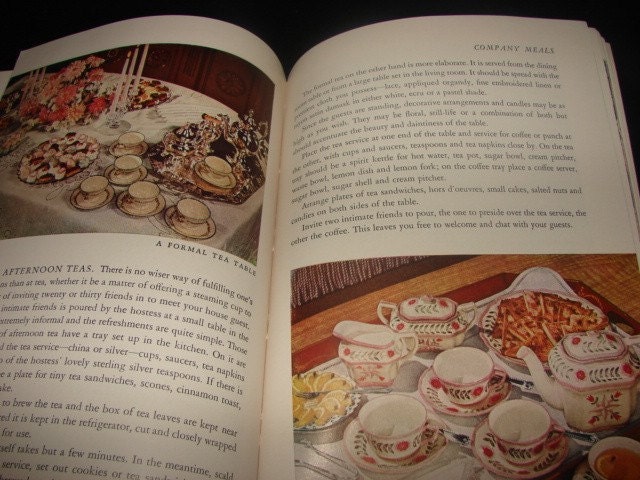
had to include their products naturally, of course.
1930

- The cookbooks of the 30’s are gems for the obvious reasons. These women had to do it all, maintaining life as normally as possible, but with the drastic decrease to incomes that literally happened overnight due to the Great Depression. Another reason that these cooksbooks are a rare treat is due to the fact that there weren't alot of companies and publishing houses printing any new books for obvious reasons. The cookbooks that were published are usually budget-minded and very practical. Money saving tips and st

retching your dollar themes are common.
This is where the glamorous and excessive recipes of the roaring 20's came to dead stop and the start of practical and miserly recipes of the 1930s started. Hostessing large, grand parties stopped. There was still entertaining but in more of a small and intimate setting with close friends, think bridge clubs and church luncheons These are where some amazing stories and recipes can be found. Makes you humble and grateful!
1920

- The cookbooks of the 1920's are known for their amazing cover illustrations and simple recipes. I love these cookbooks for the sweetness of them. Beautiful hand drawn illustrations can be found between the pages. If your lucky enough to find any with information regarding WW1 they are always desirable and quite rare but more about wartime cookbooks in the section about the 1940's.


Part 3
A truly great antique and vintage cookbook collector should be able appreciate what cookbooks from different eras have to offer and should learn what makes each decade special. A great deal of history can be learned from each decades own collection of cookbooks to point it's almost overwhelming, so to make it easier let's break it down into years and highlight what makes each decade special:
 1900-1910
1900-1910- Cookbooks from the early 1900's are great for the reason that women and views of them were changing, women wanted acknowledgement and recognition. They started to make cooking more of a scientific accomplishment than it had been in the past. That's when exact measurements came out and sanitation and cleanliness facts were made available to the masses in a way it hadn't before and how did they accomplish such a huge endevor? How did they get the information to the masses? In cookbooks! The majority of books that were published were aut

hored by women FOR women. They were generally the only non-fiction books that were controlled by women and a great way to promote values and lifestyles. They were the descision makers of the home and cookbooks were a way to change how society as whole thought, as their choices filtered to the next generations through their children.
Part 2

The best place to start is to research cookbooks of value and find out why it is they're so high priced. There are so many informative articles that go into the history of what makes a book so valuable. Maybe it's the illustrations and cover art or it's the 1st printing of a recipe classic.
Research the authors and who they are. It makes it easier looking for them than memorizing titles and covers that’s for sure. Did they write a lot or for a certain company? Which are valuable? Is it because of writing styles or was it because of the recipes themselves?

Most of the time vendors don't do the research on all the books they have for sale, but you can walk in and know exactly what you're looking for and know that your paying for something valuable and rare that’s WAY underpriced! It's a good feeling and oh so addicting!
You should narrow your collection to a smaller catagory like certain decades, specific authors or your personal nationality’s cookbooks but whatever your niche is, FIND IT. It makes finding what you're looking for so much easier because "you can't collect EVERY cookbook in the world" -my sometimes very nervous husband. I l

augh every time he says that by the way!
Appreciate what cookbooks from different eras have to offer and what makes each decade special. A great deal of history can be learned from each decade's cookbooks so let's break it down:
Part 1

People collect vintage cookbooks for so many different reasons, it would impossible to name them all here. Speaking for myself, they're a great peek into the personal side of history. We were all taught the names of the famous generals, kings and dates of all of the important wars and events, generally speaking, things the majority of us have nothing in common with. Nothing to makes us feel connected to the past. But what about the other 95% of the days and people that weren't important or dramatic enough to make it

into the history books? People like myself? I feel that cookbooks are a great way to expierience that personal connection with people that have been through the same things. What to make for dinner? On a budget? How to keep a nice home and manage your family? All have been done before and written endlessly about. A great thing about older cookbooks compared to current is that it's delicious real food made with things you already have in your pantry. Simple, great tasting food, no exotic spices here You know the recipes I'm talking about, the ones you realize you have to run to the store for half way through completing. There're

no egos getting in the way of the food either like some of the celebrity chefs of today. They're also a great investment. Financially and personally. Not to mention, let's say you never plan on selling it or try ing to make a profit from them, cookbooks usually saves you way more than what you paid for it in the tips alone and what a great family keepsake to one day hand down!
The very first White House Cook Book was published in 1887 by a lady named Fanny lemia Gillette. She had been compiling what would becoe one of the most important cookbooks to date for almost 40 years. Inside are recipes for cosmestics to cleaners, how-to's on hospitality to child rearing. Everything the lady of the house from the vistorian era ought to know. It's great tips on almost every topic made this cookbook a favorite for brides-to-be. Besides having some engravings of a few of the first ladies it lacks any of the facts about the White House itself.
Later editions featured Hugo Ziemann, the White House Steward as a co-author who included facts and illustrations of the famous house. Most of the editions include a picture the current first lady at the time of printing was, on the front piece of the book. They have amazing illustrations showing the interior of the white house that included presidential table settings and all of the classic famous prseidential rooms.
The very early editions are incredibly hard to find largely due to printing on poor quality paper, making the pages brittle and succeptable to damage. So quality and condition play a VERY big part in the value of this antique cookbook.
A great keepsake and rare collectible from any publication date makes this a true american treasure!






 Make sure you check out The White House Cook Book's history Here!!
Make sure you check out The White House Cook Book's history Here!!
My Vintage Cookbooks Store will now be posting a feature cook book each week and explaining who the author is, why the book is special, rarity and current market values. I have decided that this week the Super Special Book OF THE WEEK IS .............
Vintage Cookbooks are for everyone who has ever wanted to bake something special and turned to a modern cookbook and realized they never seem to have all the ingredients at the same time, there're for history lovers that want to feel connected to the past in a way that's missing in history books, there're for the people that love that musty old book smell and laugh at kindle's, they're for people that feel like we as a society have gone a little too far, a tad off course with life and want to get back to the simple and the real, and they're for the people that want to pay homage to all the grandma's and great aunts that did it best!
 TIPS
TIPS * Be careful of some online auction sites. Some people unload their crappiest and damaged stuff online making the description of the condition sound acceptable, hiding damage with “creative” camara angles and then ending up having a no return policy when you find out that the description was "sugar-coated". On the flip side you can get amazing steals this way also, it’s a gamble but sometimes it's the only way to get your hands on some of the bigger names. Sometimes you have to start at the bottom of the condition ladder and work your way up, if that's the only thing you can afford. Ask for pics though, the seller should be happy to oblige even if you ask for 20 more pics!
* Be careful of some online auction sites. Some people unload their crappiest and damaged stuff online making the description of the condition sound acceptable, hiding damage with “creative” camara angles and then ending up having a no return policy when you find out that the description was "sugar-coated". On the flip side you can get amazing steals this way also, it’s a gamble but sometimes it's the only way to get your hands on some of the bigger names. Sometimes you have to start at the bottom of the condition ladder and work your way up, if that's the only thing you can afford. Ask for pics though, the seller should be happy to oblige even if you ask for 20 more pics!  * Be careful of some online auction sites. Some people unload their crappiest and damaged stuff online making the description of the condition sound acceptable, hiding damage with “creative” camara angles and then ending up having a no return policy when you find out that the description was "sugar-coated". On the flip side you can get amazing steals this way also, it’s a gamble but sometimes it's the only way to get your hands on some of the bigger names. Sometimes you have to start at the bottom of the condition ladder and work your way up, if that's the only thing you can afford. Ask for pics though, the seller should be happy to oblige even if you ask for 20 more pics!
* Be careful of some online auction sites. Some people unload their crappiest and damaged stuff online making the description of the condition sound acceptable, hiding damage with “creative” camara angles and then ending up having a no return policy when you find out that the description was "sugar-coated". On the flip side you can get amazing steals this way also, it’s a gamble but sometimes it's the only way to get your hands on some of the bigger names. Sometimes you have to start at the bottom of the condition ladder and work your way up, if that's the only thing you can afford. Ask for pics though, the seller should be happy to oblige even if you ask for 20 more pics!  *Condition is a huge deal and ALWAYS buy the best you can afford.
*Condition is a huge deal and ALWAYS buy the best you can afford.




 had to include their products naturally, of course.
had to include their products naturally, of course.




















